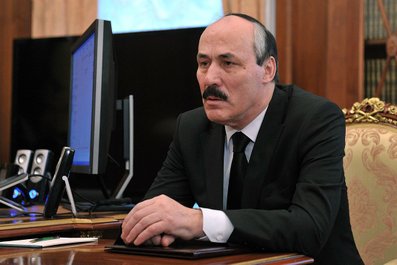
Acting Head of Dagestan Says Government May Amnesty Militants
Publication: Eurasia Daily Monitor Volume: 10 Issue: 124
By:

On June 24, the acting head of Dagestan, Ramazan Abdulatipov, said an amnesty for militants in the republic who want to return to civilian life could be announced. Abdulatipov made the surprise comments in an interview with Russian TV Channel One (Pervy Kanal). “We should learn how to forgive each other,” Abdulatipov said, striking perhaps the most conciliatory tone to date (https://www.1tv.ru/sprojects/si=5756). The Dagestani leader was responding to the earlier call by journalist Marina Akhmedova, who published an open letter on Radio Liberty’s website stating that Dagestani militants were prepared to “have an agreement” with the government since they could trust Abdulatipov, unlike the republic’s previous leaders. The journalist said she witnessed heartbreaking cases in which the police would ask mothers of militants to try to convince their sons besieged by security forces during special operations to submit to the authorities. These appeals invariably failed and the militants ended up being killed. Akhmedova blamed the stubbornness of the rebels on the fact that they could never expect mercy from the state. “Since the very beginning of the confrontation between the militants and government forces, there have been no precedents for mercifulness,” she said. “How can anybody expect to extract someone from a besieged house if the person inside has only two choices: either die quickly or go through terrible beatings and torture, give out a couple of dozen names [of other rebels] and die a long and painful death?” (https://www.svoboda.org/content/article/25015405.html).
Amnestying rebels in Dagestan could be seen as a test of Ramazan Abdulatipov’s political independence and relevance. The situation is also a test for the authorities in Moscow—namely, how much authority they are prepared to actually delegate to Abdulatipov. The head of Dagestan already stated he asked his advisers to work on an amnesty project, but Moscow has the capacity to back this effort or stall it. Potentially, if Moscow allowed Abdulatipov’s government to decide on whom to exonerate, Abdulatipov could turn into a kind of Dagestani Ramzan Kadyrov. The question, of course, is whether Moscow really wants to repeat the Chechen blueprint in Dagestan, granting the head of the republic virtually unlimited powers. Nothing less than the possibility of the “Dagestanization” of the conflict in Dagestan is currently at stake when the question of amnestying militants is decided.
The administrative logic of bringing Ramazan Abdulatipov from Moscow to Dagestan does not favor the “Dagestanization” of the conflict in the republic. Powerful opponents to an amnesty exist in the republic within the Russian security services. Russian National Antiterrorist Committee spokesman Nikolai Sintsov stated that if any regional governor approaches the committee with an amnesty initiative “it will undoubtedly be examined and a corresponding decision will be taken,” emphasizing the supremacy of the National Antiterrorist Committee over regional governors. In any case, according to Sintsov, active militants who were involved in murders would not be amnestied. If such an approach to amnesty holds—and that apparently is how Moscow perceives the amnesty in Dagestan—then it will make little sense to anyone who has any influence among the insurgents. The president of the International Islamic Mission, Shafig Pshikhachev, put it in an even more peculiar way, telling the RIA Novosti news agency that people “who ideologically joined [the rebels], but did not commit crimes” deserve to be amnestied (https://ria.ru/defense_safety/20130625/945653823.html). Pshikhachev did not explain why a person who did not commit crimes, but only shared some of the militants’ ideas, would need an amnesty.
Conservative Russian commentators went as far as to state their suspicions that Abdulatipov planned to use the amnesty to obtain more money from Moscow (https://www.segodnia.ru/content/124282). A Russian government expert on the Caucasus, Yana Amelina, responded negatively to the amnesty proposal. “No guerillas or ‘forest brothers’ are able to exist if they do not have a large support group among the so-called peaceful population,” she said. “People should understand well that if they allow the bandit into their home, they will be prosecuted the same as him [the bandit].” She said the government should not become softer, but rather harder on the Dagestani insurgency (https://kommersant.ru/doc/2219552). Amelina inadvertently revealed the logic of the current counter-insurgency campaign in Dagestan: it is not only war between a handful of insurgents and Russian forces, but a much broader struggle against the Russian government involving a large part of the Dagestani population.
Genuine and successful amnesty in Dagestan would bring different political forces in the republic together and entail groundbreaking changes in republican policies. Without giving more power to the people, the problem of violence in Dagestan is unlikely to be solved soon. At this point, the republic badly needs political reforms in order for any process of reconciliation to take place. Currently, however, Ramazan Abdulatipov does not seem to have enough political independence to proceed with any serious reforms apart from replacing some important political figures with members of his own team. Moscow, in turn, is unlikely to be willing to acquire another semi-independent republic in the North Caucasus alongside Kadyrov’s Chechnya. Thus the idea behind the amnesty project, although lucrative and potentially beneficial to curbing violence in the republic, has more enemies than genuine friends, which make its chances for success quite slim.




